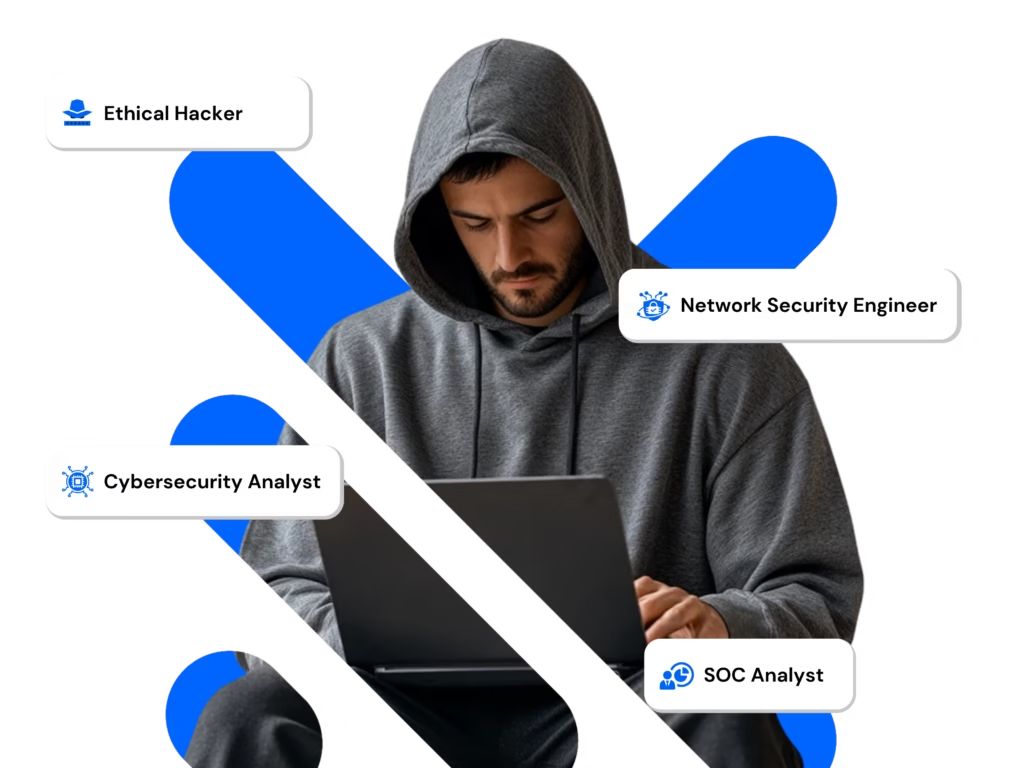- Cyber Security
- CEH v12
- EC-Council
Certified Ethical Hacker (CEH v12)
Discovering the Depths of Cybersecurity: Certified Ethical Hacking
Unveiling the Art of Ethical Invasion and Protection with Senseacademy





Trusted by over 30K students
- Aligned with the Latest Certified Ethical Hacker (CEH v12) Content Outline
- Proven Step-by-Step Blueprint for Certified Ethical Hacker (CEH v12) Expert Success
- World's #1 Certified Ethical Hacker (CEH v12) Prep to Pass in Your First Attempt


Ready for Rapid Career Growth? Our Learning Advisors Are Here to Help!
Enhance Team Skills with Our Corporate and In-House Training Programs
Overview
Certified Ethical Hacker (CEH v12) Certification training
A Certified Ethical Hacker (CEH) is a skilled professional trained to systematically attack computer systems, applications, networks, and databases to uncover vulnerabilities before malicious hackers can exploit them. By simulating the tactics and techniques used by cybercriminals, CEH professionals employ creative attack vectors and strategies to assess the security posture of a system. However, unlike cybercriminals, CEHs operate with full authorization from the system’s owners and follow a strict code of ethics, ensuring that their activities are legal and their findings are handled with confidentiality.
Certified Ethical Hackers are also adept at using a variety of tools, including penetration testing software and manual hacking techniques, to identify security loopholes that might not be immediately apparent. They stay up-to-date with the latest threats, zero-day vulnerabilities, and hacking methodologies to maintain a proactive approach in strengthening cyber defenses. Their work is crucial for identifying and patching vulnerabilities in critical infrastructures like financial institutions, government systems, and corporate networks.
Industry Demand
Unlock Opportunities: Over Certified Ethical Hacker (CEH v12) Jobs Available by 2030!
Certified Ethical Hackers (CEH v12) are increasingly sought after in today’s cybersecurity landscape, driven by the critical need for robust defenses against cyber threats. These professionals are instrumental in pre-emptively identifying vulnerabilities through ethical hacking techniques, ensuring that organizations can safeguard their digital assets and maintain regulatory compliance.
In terms of salary, CEH v12 certified professionals typically command competitive pay scales due to their specialized skills. Salaries can vary based on factors such as experience, location, and industry, but they often range from $70,000 to over $120,000 annually, reflecting the high value placed on their expertise in protecting sensitive information and systems from cyber-attacks.
Why Choose Us?
Discover the Senseacademy Advantage
Expert Instructors
Learn from industry experts with real-world experience
Flexibility
Learning formats, including online courses, workshops.
Supportive community
Connect with peers,mentors, and professionals for success
Hands-On Experience
Our courses include practical labs, real-world projects etc.
High Success Rates
Our students excel in certification and job placement
Access Recorded Sessions
Access recorded sessions anytime for flexible review.
Certified Ethical Hacker (CEH v12)COURSE PRICING
Tuition Fee
Best Seller
Live Online Classroom
Learn in expert-led live sessions
Solid Experiential Learning
- 40 Contact Hrs with Live Training
- Free On-Demand Course by Industry Experts
- Practice exams and additional resources
-
₹ 35,750₹ 32,500
Self-Paced Learning
Learn at your own pace
Solid Experiential Learning
- 40 Contact Hrs with Live Training
- Practice exams and additional resources
-
₹ 32,500₹ 29,250
WHAT YOU’LL LEARN IN THIS training
Learning Objectives
Learn Ethical hacking basics, numerous information security laws and regulations, security measures.
Footprinting conceptions and methodologies, as well as by footprinting tools and countermeasures.
Social engineering conceptions and connected terminologies like social engineering techniques, insider threats, impersonation, identity theft.
Enumeration techniques contain NFS enumeration and associated tools, DNS cache snooping, and DNSSEC Zone walking along with the countermeasures.
Conceptions of vulnerability valuation, its categories and approaches, and first-hand experience to the technologies used in industry.
PREREQUISITES FOR this CERTIFICATION TRAINING
Prerequisites and Eligibility
- Understanding of networking concepts and protocols.
- Beneficial but not mandatory experience in IT or cybersecurity.
- Knowledge of ethical hacking techniques, tools, and methodologies as outlined in the CEH v12 blueprint.
WHO SHOULD ATTEND THis COURSE ONLINE
Who This Course Is For?
- IT Security Professionals
- Network Security Engineers
- System Administrators
- Cybersecurity Consultants
- Aspiring Ethical Hackers
- IT Auditors and Compliance Professionals
- Information Security Officers
COURSE SYLLABUS
Curriculum
- This module introduces you to the basic concepts of hacking, what is hacking, who are hackers, their intent, and other related terminologies.
- The next modules dive deeper into the various phases of hacking, which would help you in thinking with the mindset of a hacker.
- Gathering information from various sources using footprinting tools and how to defend against the same.
- Different techniques to identify and scan the network, host, and port discovery by utilizing various scanning tools.
- Finding detailed information about the hosts and ports discovered during scanning. This module now includes sub-domains like NFS enumeration and related tools, DNS cache snooping, and DNSSEC Zone walking, along with the countermeasures.
- It introduces the concepts of vulnerability assessment, its types, along with a hands-on experience of tools that are currently used in the industry.
- It focuses on the “how” part How to gain access of the system, how to escalate privileges, how to maintain access, and how to clear your tracks.
- The next modules help to develop a deeper understanding of various defense and attack methodologies and concepts that aid the process of hacking.
- Malware threat terminologies, viruses, worms, trojans, their analysis, and countermeasures to prevent data loss. The introduction and analysis of malware like, Emotet and fileless that are gaining popularity have been updated under this section. APT concepts have also been added.
- Packet sniffing techniques, associated tools, and related defensive techniques.
- Since humans are the most significant vulnerability for any organization, it becomes essential to understand how attackers use them for their purpose for carrying out attacks like identity theft, impersonation, insider threat, and how to defend against such social engineering attacks.
- As DoS and DDoS are some of the most common purposes of attackers, this module talks about these attacks, use cases, and the related attack and defense tools.
- To provide a deeper understanding of the technique, its purpose, tools used along with the countermeasures.
- Understand the terminologies and working of these inline defenses and techniques to learn how to evade these while performing an attack.
- Web servers based attacks, methodologies, tools used, and defense
- Web application-based attacks, techniques, and mitigation.
- An in-depth understanding of the top OWASP top 10 web app vulnerability, its working and the mitigation.
- Wireless encryption, wireless hacking, and Bluetooth hacking-related concepts
- Management of mobile devices, mobile platform attack vectors, and vulnerabilities related to Android and iOS systems
- Recognizing the vulnerabilities in IoT and ensuring the safety of IoT devices. Operational Technology (OT) essentials, introduction to ICS, SCADA, and PLC, threats, attack methodologies, and attack prevention. The concept of OT is a new addition.
- Cloud computing, threats, and security. Additionally, the essentials of container technology and serverless computing have been added.
- Encryption algorithms, Public Key Infrastructure (PKI), cryptographic attacks, and cryptanalysis.
Information Related To Exam
Exam Information
Certification Code: 312-50 (ECC EXAM), 312-50 (VUE)
Exam Format: Multiple Choices
Question Count: 125
Exam Duration: 4 Hours
Delivery Method: ECC EXAM, VUE
Achieve Excellence: Earn the Coveted Certified Ethical Hacker (CEH v12) Certified Certification Today!


Unlock Certified Ethical Hacker (CEH v12) Certified Exam Success with Our Exclusive Offer!
Certified Ethical Hacker (CEH v12) CERTIFICATION COURSE REVIEWS
Our Learners Love Us
4.6/5 Rated by 2000+ Learners
4.6/5 Rated by 2000+ Learners
4.6/5 Rated by 2000+ Learners
Certified Ethical Hacker (CEH v12) CERTIFICATION FAQS
Frequently Asked Questions
The Certified Ethical Hacker (CEH V12) certification is one of the most highly regarded security qualifications globally. This internationally recognized certification demonstrates your expertise in identifying vulnerabilities within an organization’s network infrastructure and effectively preventing cyberattacks.
It varies for each individual. With proper guidance, a consistent study schedule, and the use of relevant resources, one month is generally sufficient to achieve good results.
It is recommended to have a bachelor’s degree in Computer Science or related discipline.
To pursue CEH certification, you must have a basic understanding of network essentials and core concepts, including server and network components.
RECOMMENDED COURSES.
Learners Also Enrolled For
Chief Information Security Officer | CCISO
- Recorded Sessions
- 40 Hours
- Hybrid
- Exam Voucher









